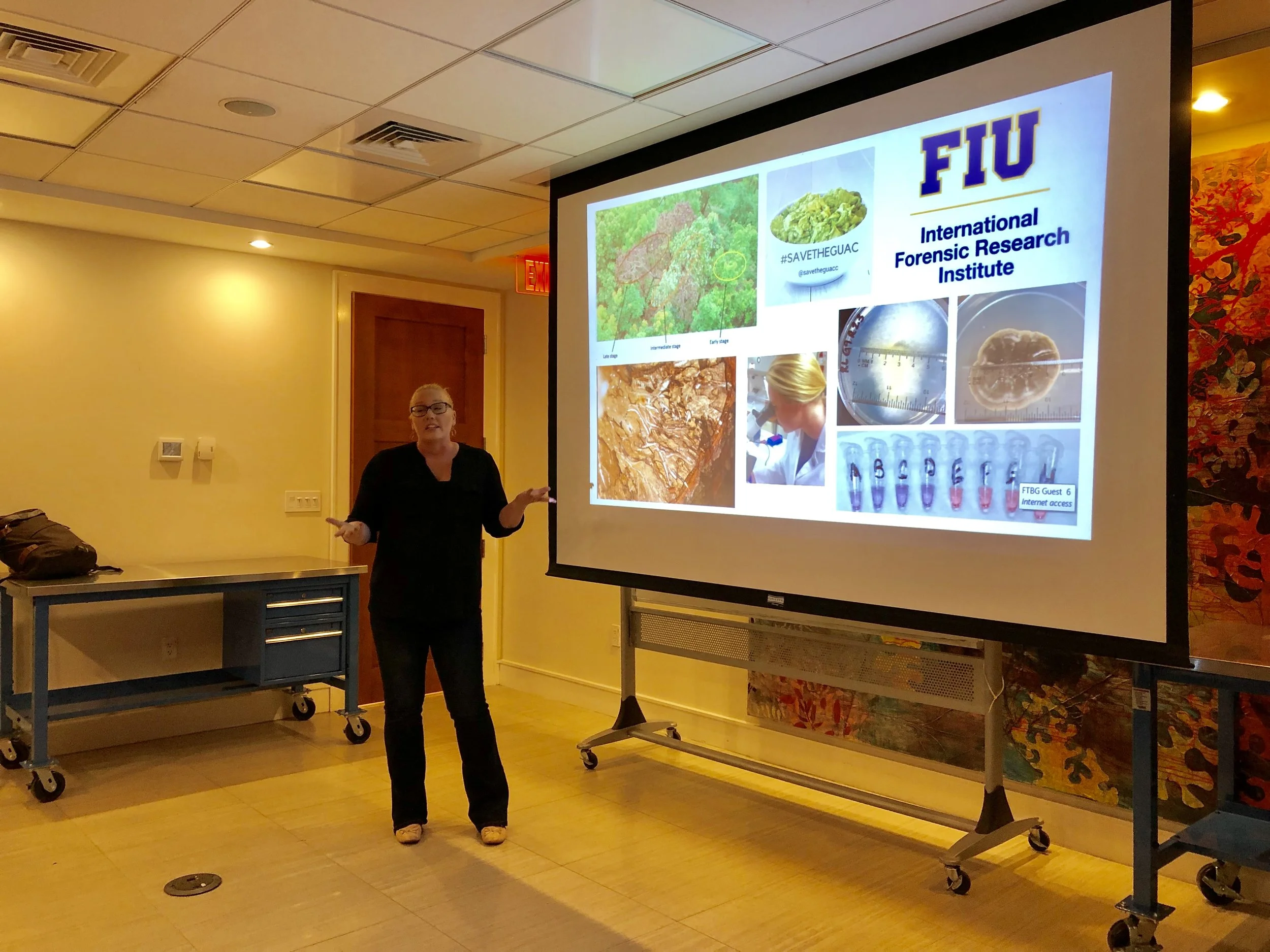Lightning Talks and an Evening Walk
Top left: Nick Palermo (FIU); Top right Tim Perez (UM); Bottom left: Olga Tserej Vazquez; Bottom right: Christina Burns
After working with the Fairchild Challenge and having had a very non-linear path towards science, I saw a unique opportunity to connect high school students with current graduate students. My experience as someone with a desire to pursue a career in science while not necessarily knowing how to go about it prompted me to create and host the Lightning Talks and Evening Walk student workshop. Last week was Fairchild’s second annual event where 30 high school students had the opportunity to hear from six graduate students from FIU and UM about their path to science.
Often you hear from established scientists in the science community, but very rarely do you hear about how they got there. During this workshop each graduate student offered unique advice to the high school students who all had some level of interest in pursuing a career in the sciences. After our brief 5-minute Lightning talks we had a pizza-fueled Q&A and then we all walked around the almost full moon lit garden with flashlights in search of night blooming plants and nocturnal animals. We smelled the delicious ylang ylang, Cananga odorata, the flower used to make Chanel no. 5. We even spotted an Eastern Screech Owl, and lots of lizards (thanks to expert Dr. James Stroud who joined us on the walk).
Here’s a very brief summary of everyone’s very brief lightning talk:
Christina Burns did her undergraduate degree at UF and had a successful career in construction for many years before returning to graduate school. She is now the lab manager of the FIU Forensics lab and studies the fungal pathogen that is causing laurel wilt, the disease plaguing our avocados. Her advice to students is to travel and see the world, follow your passions, and most importantly check in with yourself and be honest. If you aren’t happy, there’s always time to change paths and reinvent yourself, as many times as you want.
Tim Perez University of Vermont alum, enjoyed being outside more than in the classroom. After graduating he spent several years working on different projects and even had a new species of fruit fly named after him. He encourages students to pursue research opportunities. Undergraduate programs are course-based but as a graduate student you will need the support of an advisor and research experience is always appealing. Tim now studies how tropical forests are responding to climate change.
Nick Palermo had parents that really wanted him to become a doctor. So he went after a degree in biology but couldn’t escape his love for tinkering. Always inventing things he encouraged students to play around with Arduinos, an open-sourced platform for building electronic projects. He currently studies neurobiology in fruit flies, specifically their visual attention when manipulated in a flight arena.
Donna Molfetta did her undergraduate degree at Cornell and was the only one of us who knew from the beginning that she wanted to be a biologist. As a young girl she was always reading National Geographic and other wild life magazines. Her words of wisdom: failure is a part of success don’t let it discourage you. She now studies how urbanization affects Red-shouldered hawks.
Olga Tserej Vazquez got her undergraduate degree at the University of Havana in Cuba where she did a UNESCO fellowship in Moscow. She worked in Havana as curator of the Cuban National Museum of Natural History. When she moved to the USA 3 years ago she was a high school biology teacher and an administrator for UM’s Nursing school before starting a non-thesis Master’s program. Over the summer she studied the thermal ecology of trees with Dr. Ken Feeley and shortly thereafter joined his lab, changing her program from a masters to PhD. She encouraged students to study abroad and make connections. The experience will give you friends and networks all over the world.
We all agreed that science disciplines overlap and that biology, as a foundation is pretty flexible. Moral of the story: If you find nature intriguing, pursue it! Even if you discover that you hate it, that’s an important part of your path. Most importantly, the world needs conscious citizens and people who care about the environment regardless of career path!
Cover photo courtesy of Tim Perez



